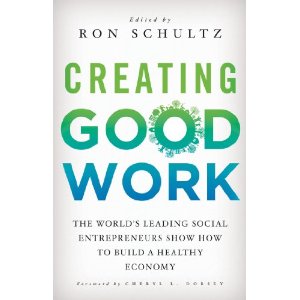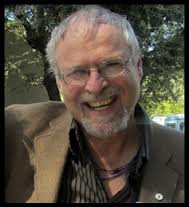Friday
Community ArticlesCreating Good Work
 Introducing a NEW COLUMN:
Introducing a NEW COLUMN:
In Everyday Life
In which we visit with Shambhala practitioners from all walks of life to hear stories about their life, livelihood and how their meditation practice permeates their everyday experience.
To begin with, we spent some time this week interviewing Ron Schultz, sangha member from Los Angeles who has just had a new book published called Creating Good Work – The World’s Leading Social Entrepreneurs Show How to Build a Healthy Economy (Palgrave Macmillan). It is his 23rd book and this one has contributions from over 20 of the foremost social innovators working today. We asked him more about it…
It turns out that the Creating Good Work book was inspired by the whole notion of creating enlightened society. Ron expressed that what he found most interesting was that the people who read advance copies of the book picked up on that right away. “Creating enlightened society is ultimately the driving force of the book,” he said, “but it’s also another means of reaching out into the community to help create enlightened society through creating good work and social innovation.”
Cheryl L. Dorsey, the president of Echoing Green, notes in her forward that the book arrives at a critical time in the relatively short history of the social entrepreneurial movement. The field is at something of a turning point. As Jeffrey Hollender points out in a review of the book, “Social entrepreneurs are committed to a goal that neither our government nor big business has been willing to take on — the building of an enlightened society. It’s the job of these special people who want to leave the world a better place for those who have yet to be born. The book provides practical, hard-won advice for how prospective and even in-the-trenches social entrepreneurs can do just that.”
“Building a healthy economy is not about dreaming it, it’s about building it,” Ron further explained. “This is really an action-based approach to making a healthy economy happen and it’s engaging people at a level that they seem to resonate with, just the way we experience the arising of basic goodness.” Ironically, the contract for Creating Good Work arrived while Ron was at Vajrayana Seminary at Karme Choling two years ago. “Auspicious timing!” But let’s step farther back in time.
For the last dozen years, Ron has been working with social entrepreneurs. His career before that was as a business consultant, in which he worked with entrepreneurs on both the cultural and operational aspects of business. About 12 years ago, he was in London where he was introduced (at a pub) to a woman who was starting the London office of Ashoka: Innovators for the Public, one of the founding organizations in the field of Social Entrepreneurship. Ashoka’s chairman, Bill Drayton, is still the guiding light for the organization and is the one who coined the term “social entrepreneur.”
“The moment I heard about social entrepreneurship in that pub,” Ron said, “all the bells and whistles started going off in my head. I realized this was where I needed to be, to apply the business acumen I had developed, and to help social entrepreneurs to become better at running the enterprises they were operating.” Ron eventually worked for Ashoka for two years and after that went to work for Volunteers of America in Los Angeles (VOALA), CA. It was there that he started a social entrepreneurial incubator. For the next two years, he learned and worked to formulate the whole process of Social Entrepreneurship in LA. He described it as an amazing opportunity.
Muhammad Yunus and the Grameen Bank (winner of the 2006 Nobel Peace Prize), had asked VOALA to start a Grameen microfinance project in LA, which Ron eventually inherited. It was here he learned that microfinance could provide immediate support for new social entrepreneurs. In lay terms, Ron explains, “You have to educate entrepreneurs. You have to provide them with access to funding and capital and that’s the basis for the work I’ve been doing for the last 10 years. In doing that I’ve been traveling to conferences and engaging with folks all over the world. I have had the opportunity to meet extraordinary entrepreneurs.”
Ron had already written some other “industry bibles” – among his 22 other books. He realized that today’s society needed an “industry bible” for social entrepreneurship. He approached Palgrave Macmillan and they jumped on it. The response from the community was amazing and, Ron says, “The work that was done by the contributors was incredibly inspiring. The differentiation of Creating Good Work is that it is not a hero story book – it’s a book about how you get it done.” It is about the theory, application and practice of how one can drive social entrepreneurialism and how you turn those ideas into something, and ultimately how you keep it going. “Other books on the subject venerate social entrepreneurialism,” Ron explains, “but we’re saying: let’s see this as the work we should be doing, and let’s do it.”
The core message of this book is building a healthy economy. There are three aspects to this: nurturing resilience, creating work that is meaningful and purposeful, and creating enough wealth. The first step of nurturing resilience is all about change – the willingness to change, allowing others to change, and making sure change doesn’t burst the boundaries you have established for running your operation. Creating good work is about working with groups and organizations to create work that shifts our economies, and at the same time developing work that is meaningful and purposeful.
“It turns out that meaningful work is work that benefits others,” Ron described. “No surprise there to meditators! When you ask people what is satisfying in their work, they respond that it’s most satisfying when they are benefiting others. When people are only involved in taking from the system and not giving back, they eventually feel dissatisfied with what they’ve done. We want to shift that thinking so we can build a healthier economy. And that all comes out of practice.”
Creating enough wealth comes as a natural outpouring of the first two steps, and this topic is further explored in the book.
“In our entrepreneurial training,” Ron went on to say, “we’ve started incorporating meditation instruction so that all entrepreneurs have the opportunity to sit. It’s a key aspect of leadership because leadership is a reflexive process, not a reactive one.” So, it comes full circle.
Coming soon will be a number of events bringing in a mixture of Shambhala and local community members. The events are designed to be hosted by a Shambhala Center with, Ron explained, “the aim to bring in organizations within the community that are doing good work to talk about how we create a healthy economy in our communities locally.”
The first event will be hosted by the Northern California Shambhala Centers on February 7th. For more information, please visit: www.sf.shambhala.org
 ~~
~~
Ron Schultz is the editor of Creating Good Work, is the founder and President of Entrepreneurs4Change. He has written or co-written along with having published 22 previous books including: Coherence in the Midst of Complexity, Adjacent Opportunities – Sparking Emergent Social Action, and Open Boundaries: Creating Business Innovation through Complexity (with Howard Sherman).





Feb 5, 2013
Reply
I’ve read this over twice and find that there is no example given of a social entrepreneur. How is a social entrepreneur different that a regular run o’the mill entrepreneur.? There there is “satisfying work” that benefits others, like? Then there is “building the economy,” by what system? We still have the same old capitalist system as the undertow so anything a social entrepreneur is going to field will still be under that umbrella. Then, suddenly, the term leadership is thrown in there. This entire explanation is replete of examples. I realize you might then say to me, “read the book.” That would be fine but if the same non-objective dialogue is employed I’d rather save the cost. Gimme somethin’ to hold on to here…anything…sans jargon.
Feb 4, 2013
Reply
Hi all – looking forward to reading Ron’s book, and talking with him about moving forward in creating “Good Work.”
Lee – I hear your concerns re current attempts at social ventures, but rather than rejecting “social enterprise” as a myth, maybe regard it as a possibility that can be shaped and furthered by your experience.
I’m totally a beginner in all of this, but it seems that we all need to figure out best ways to be of service – and deep listening for the basic needs of all seems a good place to begin – so I’m interested in what Ron, and you, and so many others out in the field working on “Good Work” have to teach –
please – let’s continue the conversation!
Feb 1, 2013
Reply
Social Enterprise in China entered a few years ago as the white knight that would find the ideal marriage of corporate social responsibility and community development. But despite all the hoop-la, it hasn’t worked out that way, because the major indicators of poverty like infant and maternal mortality the responsibility of the government. When they figure out how to stop poor mothers from dying in pregnancy and childbirth, then the sea will change. Some people believe that the answer is making people rich — such as happened in poor Tibetan regions when Han Chinese people started buying mastiffs. Then the buyers moved into some other conspicuous consumption du jour and the market dropped out. Same with cordyceps sinesis and Pu-er tea. There are foundations here that get Tibetans to make traditional designed back packs, and attache cases. Tibetans don’t use backpacks and don’t use attache cases. The question is really not one of economy, but the kind of arrogance that believes that the best friend of culture is money. Why not help people to create the expressions of their culture that are getting lost to materialism? The problem is that to do that you have to ask questions, not of the members of a society who are as ambitious as successful western entrepreneurs, but to common people. The problem is that these people are slow and it might take 10 or 20 years to get an answer. This is not a solution made for our speedy society.
Maybe people will hear that and think, “he wants to keep them poor.” But actually no one has actually asked these ultra-poor people what they want. There are schools for orphans here, many of them, that teach this and that. I asked the headmaster, a foreigner, “since 1/2 of the Tibetans are nomads, how does what you are teaching help them to become better nomads?” He said, “maybe they shouldn’t be nomads.” Case closed. The problem is that all these things are so far downstream from basic stuff like 5 nuns dying a year from hepatitis in a big nunnery, or pregnant women facing a much bigger (3x) threat to their lives that a soldier in Afghanistan. Or 1 in 5 children dying before they are 2.
This has nothing to do with enterprise and to tell the truth, nothing to do with religion and everything to do with helping very poor people to have access to health and life. This is the business of public health. Sorry to rant, but social enterprise is just another myth du jour for cultures that are imploding for reasons having nothing to do with money.
Feb 1, 2013
Reply
Very cool. Look forward to reading this!